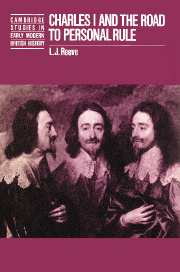Book contents
- Frontmatter
- Contents
- Acknowledgements
- List of abbreviations
- 1 Introduction
- 2 Buckingham's England in crisis
- 3 The death of a Parliament
- 4 The aftermath
- 5 Government and justice
- 6 The king, his court and its enemies
- 7 Foreign policy
- 8 Decision
- 9 The anatomy of a political transition
- Bibliography
- Index
- Cambridge Studies in Early Modern British History
9 - The anatomy of a political transition
Published online by Cambridge University Press: 13 October 2009
- Frontmatter
- Contents
- Acknowledgements
- List of abbreviations
- 1 Introduction
- 2 Buckingham's England in crisis
- 3 The death of a Parliament
- 4 The aftermath
- 5 Government and justice
- 6 The king, his court and its enemies
- 7 Foreign policy
- 8 Decision
- 9 The anatomy of a political transition
- Bibliography
- Index
- Cambridge Studies in Early Modern British History
Summary
The most satisfying historical explanation must always combine analysis of the particular and the general, the wide canvas and the immediate detail of events. It must also incorporate understanding of various aspects of human life: the personal, political, economic and social as well as the intellectual and religious. As I trust I have shown, only such a liberal historical approach can be expected to comprehend the complexities involved in the emergence of Charles's regime. At this point one might ask whether the making of that regime was a revolutionary or more evolutionary development. The question, however, is misplaced and the answer could legitimately (and unhelpfully) be ‘neither’ or ‘both’. This period saw a most complicated re-orientation of English politics as the implications of Charles's rule began to be worked out. What can be said is that the year 1629, traditionally assumed to have marked a sudden departure, did no such thing. It is also true, however, that Charles's attitudes were eventually decisive.
This study has rested on the assumption that English developments during this period can only be understood within their international context. The Thirty Years War arguably constituted the cataclysmic end of the Renaissance world. The prevailing European climate was one of war, with all that that implied. England could not avoid its effects. The emergence of Charles's personal rule was a European event. It was so in the sense of being an inextricable part of the whole, but also in the sense that English events sometimes had a critical impact upon European affairs. Most notably, the fate of the Palatinate, with which England was intimately concerned, was a matter of vital significance for all the great powers.
- Type
- Chapter
- Information
- Charles I and the Road to Personal Rule , pp. 292 - 296Publisher: Cambridge University PressPrint publication year: 1989

